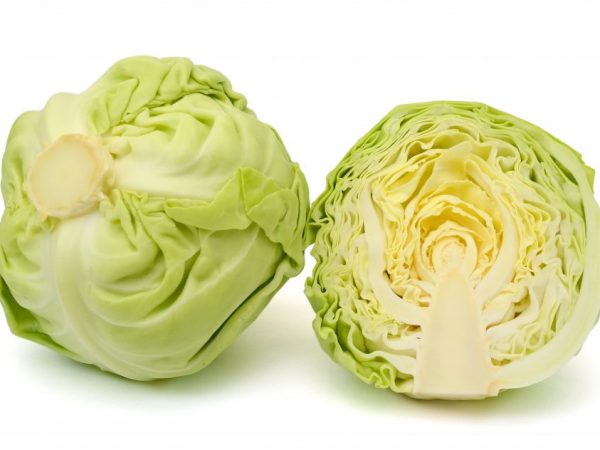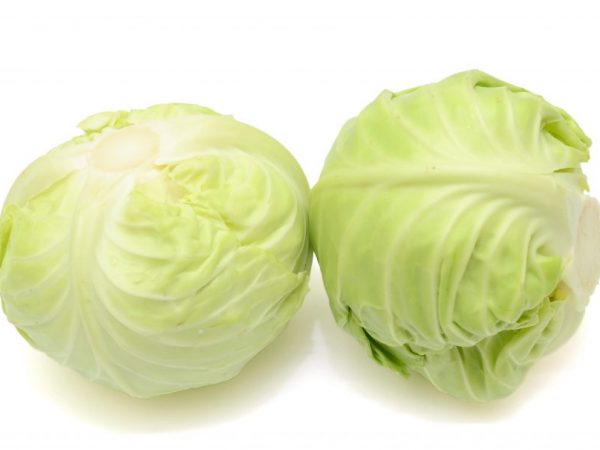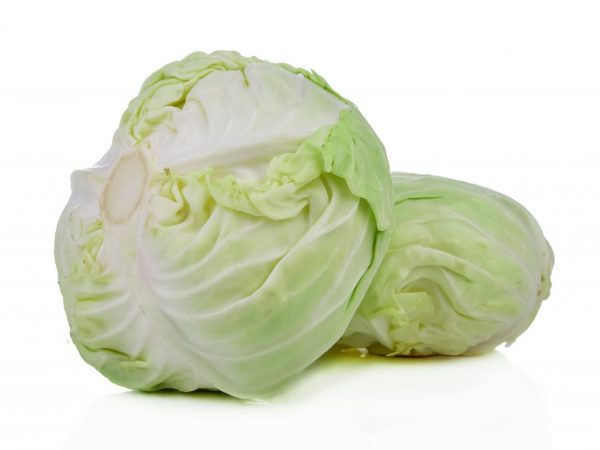Vitamins in cabbage
The content of useful vitamins in cabbage is high - these are vitamins of group B, C, E, K. Also, this product contains macro- and microelements that have a positive effect on overall well-being.

Vitamins in cabbage

Vitamins
Cabbage is a food product that has a beneficial effect on human health and condition. Allows you to cleanse the stomach of harmful substances, improve the redox balance.
Vitamins found in cabbage:
- AND;
- IN 1;
- IN 2;
- AT 4;
- AT 6;
- AT 9;
- FROM;
- E;
- TO;
- PP, etc.
Vitamins in cabbage eliminate painful sensations. You need to attach a cabbage leaf to the inflamed area or place it in the area of edema so that the pain subsides.
Vitamin A
The amount of this vitamin in cabbage is 3 mcg. Retinol is needed for the formation of the skeletal system, accelerates the process of tooth growth. It slows down the aging process, but stimulates the rapid neoplasm of cells.
Retinol has a great effect on vision. If you eat cabbage regularly and do the appropriate exercises, your eyes will become less tired and your eyesight will improve.
Vitamin A is involved in digestion processes. Prevents the development of gastrointestinal infections. Thanks to its effect, the channels of urination are cleared.
It is effective to use cabbage in the presence of skin diseases. Retinol accelerates skin regeneration and helps get rid of acne.
Vitamin B1
Thiamine is essential for brain function. Activates brain activity, thought processes. Thanks to the use of thiamine, a person's memory improves, he becomes more concentrated and productive.
Its content in cabbage is 0.03 mg. This is enough to normalize appetite, mood and performance.
Other beneficial properties of thiamine are:
- slowing down the aging process;
- maintaining the normal functioning of the heart;
- reducing the negative impact of alcohol and tobacco;
- elimination of nausea and gag reflex;
- getting rid of toothache.
Vitamin B2
Vitamin improves visual acuity. Improves dark adaptation, shortens its duration. Participates in providing light vision. Protects the fiber of the eye from UV rays.
It helps burn fat, which helps keep skin supple and healthy. The number of rashes and skin diseases is noticeably reduced. Reduces oily shine or dryness of the face.
Under the influence of B2, the processes of the nervous system are normalized. Stress resistance increases, sleep and performance improve.
B2 is found only in fresh cabbage. Evaporates after heat treatment.
Vitamin B4

Cabbage improves metabolism
The presence of choline is valuable for the liver. It clears faster and is less affected.
Cabbage, which contains vitamin B4, normalizes the process of removing fats. Responsible for the processing of heavy food, i.e. regulates metabolic processes.
Choline also benefits from:
- rapid mastering of new information, because the component helps in the development of short-term and long-term memory;
- accelerating the transmission of nerve impulses;
- reduces the amount of homocysteine in the blood, which, at high concentration, causes arteriosclerosis;
- maintaining a normal mental state.
Vitamin B6
Pyridoxine normalizes most of the chemical reactions in the body. A large intake of cabbage leads to the prevention of sharp spikes in blood glucose.
Pyridoxine is needed to activate the metabolic process in the brain tissues. Thanks to him, memory improves - the process of memorizing new information is accelerated, efficiency increases. If a person is under stress, he should eat a lot of cabbage. It enhances reparative processes, as a result of which the body quickly comes to rest.
Another useful property of pyridoxine is that in diabetes mellitus, it removes excess fluid from the body, while lowering blood pressure. It also helps with mental health problems. it contains serotonin.
Vitamin B9
Folic acid is necessary in the presence of diseases of the diuretic system. Useful for women who use birth control pills to maintain normal body function.
Other health benefits of folic acid include:
- eliminates gum inflammation;
- removes neuralgic pain;
- relieves insomnia;
- relieves fatigue and irritation.
The presence of this vitamin in the body has a positive effect on the productive work of the brain. A person becomes more resilient, gets tired more slowly, copes with work faster, rarely suffers from stress and depression, often has a good, high spirits.
Vitamin C
Ascorbic acid is found in fresh white cabbage. Its amount in the total vitamin composition (per 100 g of vegetable) is the largest - 40 mg.
This acid helps to increase the resistance level of the body, i.e. improves the immune system. As a result of regular consumption of cabbage, a person will be less sick. The risk of developing cancer is reduced.
Vitamin C reduces vascular permeability. Thanks to this, the risk of uterine and nosebleeds is reduced significantly. When consuming cabbage, intoxication decreases after excessive alcohol consumption. It slows down the aging process and deterioration of the color and structure of the facial skin.
Vitamin E

It is important to eat cabbage during pregnancy.
The content of this component in 100 g of a vegetable is small - up to 0.06 mg. Helps maintain normal water balance in the body. Reduces the risk of prostate and bladder cancer in men.
Due to the presence of this vitamin in cabbage, the likelihood of miscarriage in women is reduced. It is important to take this vegetable during pregnancy and after childbirth (at least the first 3 months during recovery). Normalizes sensitive glands, which is important for HS. The product is eaten fresh or stewed.
The beneficial effect of vitamin E is displayed on the skin of the face. It becomes smoother, less greasy, but not dry. Freckles are less pronounced, rashes disappear.
Vitamin K
It is necessary to regulate blood clotting, bone mineralization. Vitamin K-rich cabbage has the following beneficial properties:
- ensures the normal development of the skeleton in children and embryos;
- protects the elderly from osteoporosis;
- takes an active part in oxidative processes;
- neutralizes toxic drugs and components that enter the body through harmful food;
- regulates blood sugar levels;
- prevents age-related inflammation, hormonal disruptions;
- promotes relaxation of the uterus after childbirth.
Vitamin K, which is rich in cabbage, has an antibacterial effect. Normalizes energy balance. As a result, a person is more resistant to stress and is able to control his emotions.
Vitamin PP
For those with joint problems, it is important to consume cabbage.It contains vitamin PP, which stimulates the production of inter-articular fluid.
Counteracts inflammatory processes, extinguishing the main foci. Together with ascorbic acid, it normalizes the work of the gastrointestinal tract, preventing the development of stomach cancer, pancreatitis, ulcers and other diseases.
Fresh cabbage is especially rich in vitamin PP. This reduces allergic reactions. The level of carcinogenic substances decreases.
The presence of this component has a beneficial effect on the secretory function of the liver and stomach. It prevents the development of cataracts and gout.
Macronutrients
Cabbage affects metabolic procedures in the body. The content of macronutrients in it has a beneficial effect on the work of the cardiovascular system. Stimulates the production of gastric juice.
The main minerals found in this vegetable are:
| Macronutrient name | Beneficial features |
| Potassium | Stimulates thought processes. Facilitates the course of allergic reactions (especially during periods of exacerbation). Allows you to normalize blood pressure. Improves muscle contractions. Stimulates the normal development of the skeleton in children. |
| Magnesium | Has a sedative effect, which is important for frequent stress. Relaxes the body, helps to fall asleep faster in case of sleep disorders. Helps the body store calcium in bones and teeth. Supports hormonal balance, so that pain during menstruation practically does not bother the girl. |
| Phosphorus | This mineral is important for young children because stimulates the growth and development of the skeleton. Takes part in the synthesis of enzymes, which improves overall well-being. |
| Calcium | It has a beneficial effect on blood clotting. Able to fight cholesterol. Eliminates dysfunction in the gastrointestinal tract. Normalizes the work of the cardiovascular system. |
| Sodium | Takes part in the normalization of the water-salt balance. Activates the production of gastric juice. Generates the functions of the muscular system. Has a vasodilating effect. |
Trace elements
White cabbage contains only 6 trace elements. They improve intracellular respiration. Provides full muscle contraction.
The main microminerals that a vegetable contains, per 100 g:
- Iron. Participates in the formation of hemoglobin. Improves the functioning of the immune system. Normalizes the work of the diuretic system.
- Iodine. It has a beneficial effect on the thyroid gland. It is necessary for the development of the nervous system and bone marrow in a child.
- Cobalt. Reduces blood cholesterol levels. Activates metabolism. Participates in the restoration of damaged bone tissue. It is needed to improve the activity in the pancreas.
- Manganese. Regulates blood glucose levels. Improves brain activity. Participates in cell division. Reduces blood sugar levels.
- Copper. Improves hair structure. It has a beneficial effect on the formation of nerve cells. Converts iron to hemoglobin.
- Zinc. Prevents the development of diabetes mellitus. Improves the condition of nails and hair. It has a positive effect on mental abilities.
Conclusion
Cabbage contains many vitamins, trace elements and minerals. They are needed to normalize the functioning of various body systems and prevent diseases. They improve the general condition, increase immunity, and relieve fatigue.


